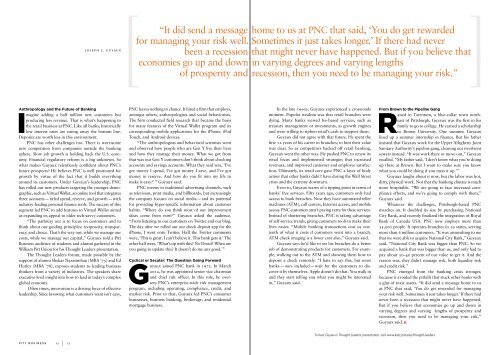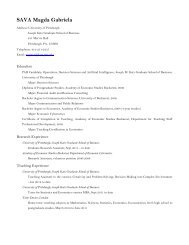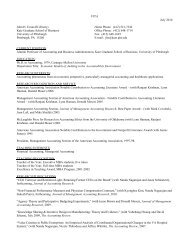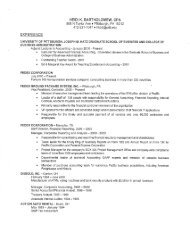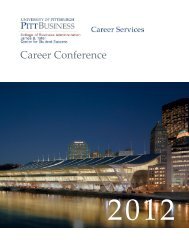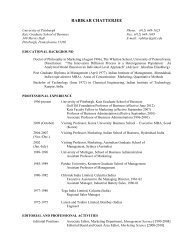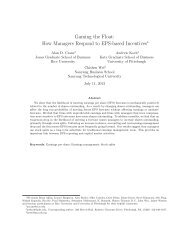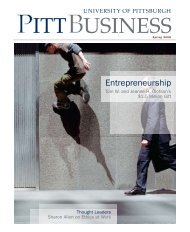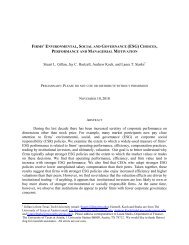Download PDF - Pitt Business - University of Pittsburgh
Download PDF - Pitt Business - University of Pittsburgh
Download PDF - Pitt Business - University of Pittsburgh
Create successful ePaper yourself
Turn your PDF publications into a flip-book with our unique Google optimized e-Paper software.
joseph c. guyaux<br />
“It did send a message home to us at PNC that said, ‘You do get rewarded<br />
for managing your risk well. Sometimes it just takes longer.’ If there had never<br />
been a recession that might never have happened. But if you believe that<br />
economies go up and down in varying degrees and varying lengths<br />
<strong>of</strong> prosperity and recession, then you need to be managing your risk.”<br />
Anthropology and the Future <strong>of</strong> Banking<br />
Imagine adding a half million new customers but<br />
producing less revenue. That is what’s happening to<br />
the retail business at PNC. Like all banks, historically<br />
low interest rates are eating away the bottom line.<br />
Deposits are worth less in this environment.<br />
PNC has other challenges too. There is worrisome<br />
new competition from companies outside the banking<br />
sphere. Slow job growth is holding back the U.S. economy.<br />
Financial regulatory reform is a big unknown. So<br />
what makes Guyaux relentlessly confident about PNC’s<br />
future prospects He believes PNC is well positioned for<br />
growth by virtue <strong>of</strong> the fact that it builds everything<br />
around its customers. Under Guyaux’s leadership, PNC<br />
has rolled out new products targeting the younger demographic,<br />
such as Virtual Wallet, an online tool that integrates<br />
three accounts — titled spend, reserve, and growth — with<br />
industry-leading personal finance tools. The success <strong>of</strong> this<br />
segment led PNC to add features to Virtual Wallet aimed<br />
at expanding its appeal to older tech-savvy customers.<br />
“The pathway out is to focus on customers and to<br />
think about our guiding principles: reciprocity, transparency,<br />
and choice. That’s the way out, while we manage our<br />
costs, while we manage our capital,” Guyaux told a <strong>Pitt</strong><br />
<strong>Business</strong> audience <strong>of</strong> students and alumni gathered in the<br />
William <strong>Pitt</strong> Union for his Thought Leaders presentation.<br />
The Thought Leaders forum, made possible by the<br />
support <strong>of</strong> alumni Shekar Narasimhan (MBA ’75) and Ed<br />
Hurley (MBA ’78), exposes students to leading business<br />
thinkers from a variety <strong>of</strong> industries. The speakers share<br />
executive-level insight into how to lead in today’s complex<br />
global economy.<br />
Often times, innovation is a driving force <strong>of</strong> effective<br />
leadership. Since knowing what customers want isn’t easy,<br />
PNC leaves nothing to chance. It hired a firm that employs,<br />
amongst others, anthropologists and social behaviorists.<br />
The firm conducted field research that became the basis<br />
for many features <strong>of</strong> the Virtual Wallet program and its<br />
corresponding mobile applications for the iPhone, iPod<br />
Touch, and Android devices.<br />
“The anthropologists and behavioral scientists went<br />
and observed how people who are Gen Y live their lives<br />
and how they manage their money. What we got from<br />
that was our Gen Y customers don’t think about checking<br />
accounts and savings accounts. What they said was, ‘I’ve<br />
got money I spend, I’ve got money I save, and I’ve got<br />
money in reserve. And how do you fit into my life to<br />
make it easy’ ” Guyaux said.<br />
PNC invests in traditional advertising channels, such<br />
as television, print media, and billboards, but increasingly<br />
the company focuses on social media — and its potential<br />
for providing hyper-specific information about customer<br />
habits. “Where do you think most <strong>of</strong> our improvement<br />
ideas come from now” Guyaux asked the audience.<br />
“From listening to our customers on Twitter and our blog.<br />
The day after we rolled out our check deposit app for the<br />
iPhone, I went onto Twitter. Half the Twitter comments<br />
were, ‘This is great. I can’t believe it. This bank gets it.’ The<br />
other half were, ‘What’s up with this No Droid When are<br />
you going to update this It doesn’t do me any good.’”<br />
Cyclical or Secular: The Question Going Forward<br />
Guyaux joined PNC bank in 1972. In March<br />
2012, he was appointed senior vice chairman<br />
and chief risk <strong>of</strong>ficer. In this role, he oversees<br />
PNC’s enterprise-wide risk management<br />
program, including operating, compliance, credit, and<br />
market risk. Prior to that, Guyaux led PNC’s consumer<br />
businesses, business banking, brokerage, and residential<br />
mortgage business.<br />
In the late 1990s, Guyaux experienced a crossroads<br />
moment. Popular wisdom was that retail branches were<br />
dying. Many banks viewed fee-based services, such as<br />
treasury management or investments, as growth engines<br />
and were willing to siphon retail’s cash to support them.<br />
Guyaux did not agree with that future. He spent the<br />
first 12 years <strong>of</strong> his career in branches; to him their value<br />
was clear. So as competitors backed <strong>of</strong>f retail banking,<br />
Guyaux went the other way. He pushed PNC to renew its<br />
retail focus and implemented strategies that increased<br />
revenues, and improved customer and employee satisfaction.<br />
Ultimately, its retail core gave PNC a layer <strong>of</strong> body<br />
armor that other banks didn’t have during the Wall Street<br />
crisis and the extreme downturn.<br />
Even so, Guyaux warns <strong>of</strong> a tipping point in terms <strong>of</strong><br />
banks’ free services. Fifty years ago, customers only had<br />
access to bank branches. Now they have automated teller<br />
machines (ATM), call centers, Internet access, and mobile<br />
access. PNC customers aren’t paying extra for these services.<br />
Instead <strong>of</strong> shuttering branches, PNC is taking advantage<br />
<strong>of</strong> self-service trends, giving customers tools to make their<br />
lives easier. “Mobile banking transactions cost us onetenth<br />
<strong>of</strong> what it costs if customers went into a branch.<br />
ATM check imaging is a lower cost also,” Guyaux said.<br />
Guyaux says he’d like to see his branches do a better<br />
job <strong>of</strong> demonstrating products for customers. For example,<br />
walking out to the ATM and showing them how to<br />
deposit a check remotely. “I hate to say this, but most<br />
banks — ours included — wait for the customers to discover<br />
it by themselves. Apple doesn’t do that. You walk in<br />
and they start telling you what you might be interested<br />
in,” Guyaux said.<br />
From Brown to the Pipeline Gang<br />
Raised in Tarentum, a blue-collar town northeast<br />
<strong>of</strong> <strong>Pitt</strong>sburgh, Guyaux was the first in his<br />
family to go to college. He earned a scholarship<br />
to Brown <strong>University</strong>. One summer, Guyaux<br />
lined up a summer internship in finance. But his father<br />
insisted that Guyaux work for the Upper Allegheny Joint<br />
Sanitary Authority’s pipeline gang, cleaning out riverfront<br />
sewers instead. “It was work there or move out,” Guyaux<br />
recalled. “My father said, ‘I don’t know what you’re doing<br />
up there at Brown. But I want to make sure you know<br />
what you could be doing if you mess it up.’”<br />
Guyaux laughs about it now, but the labor was hot,<br />
dirty, physical work. Not that the banking climate is much<br />
more hospitable. “We are going to face increased compliance<br />
efforts, and we’re going to comply with them,”<br />
Guyaux said.<br />
Whatever the challenges, <strong>Pitt</strong>sburgh-based PNC<br />
marches on. It doubled its size by purchasing National<br />
City Bank, and recently finalized the integration <strong>of</strong> Royal<br />
Bank <strong>of</strong> Canada USA. PNC now employs more than<br />
55,000 people. It operates branches in 19 states, serving<br />
more than 6 million customers. “It was astonishing to me<br />
that we were able to acquire National City Bank,” Guyaux<br />
said. “National City Bank was bigger than PNC. So we<br />
acquired a bank that was bigger than us, and only had to<br />
pay about 30–40 percent <strong>of</strong> our value to get it. And the<br />
reason was, they didn’t manage risk, both liquidity risk<br />
and credit risk.”<br />
PNC emerged from the banking crisis stronger,<br />
because it avoided the pitfalls that stuck other banks with<br />
a glut <strong>of</strong> toxic assets. “It did send a message home to us<br />
at PNC that said, ‘You do get rewarded for managing<br />
your risk well. Sometimes it just takes longer.’ If there had<br />
never been a recession that might never have happened.<br />
But if you believe that economies go up and down in<br />
varying degrees and varying lengths <strong>of</strong> prosperity and<br />
recession, then you need to be managing your risk,”<br />
Guyaux said. <br />
To hear Guyaux’s Thought Leaders presentation, visit www.katz.pitt.edu/thought-leaders.<br />
<strong>Pitt</strong> business 12 | 13


